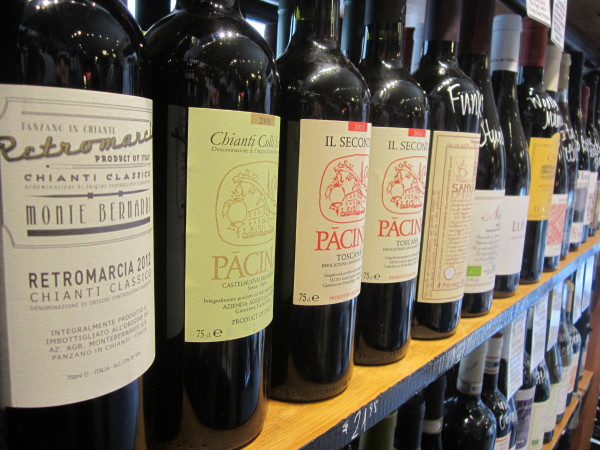
Previously, the Cambridge Formaggio Kitchen wine department took care to identify the wines on its shelves that were made from organically or biodynamically farmed grapes and with no — or minimal — applications of sulfur. We used little ladybug icons to set them apart. It seemed like a reasonable step to take, since a significant subset of our clientele expresses a preference for wines made this way.
But there were some drawbacks to this approach — primarily, the implication that wines that couldn’t flash a ladybug badge were somehow of a second order of quality or moral standing. One can imagine the line of thinking this might initiate: If they’re not farming organically, what must be going on in those vineyards? Routine and frequent applications of chemical fertilizers? Pesticides, herbicides, and fungicides sprayed on a fixed schedule whether vines are actually threatened or not?
The fact is that we don’t sell any wine that can be described this way.
The choices made by conscientious wine growers are conditioned by durable facts on the ground, the vagaries of the vintage, and the style of wine that is in view. Durable facts on the ground include, for example, whether the climate is dry or damp, whether the vineyard has a good flow of air, how pervasive mildews may be. In places like sunny, dry Sicily, prevailing conditions make organic agriculture relatively easy to accomplish. In cool, damp Bordeaux or almost anywhere in the U.S. east of the Mississippi, it can require heroic efforts.
Climate is what you expect, weather is what you get. And from year to year the degree to which winegrowers are challenged by nature can vary wildly. For many smaller-scale and family operations (the most numerous kind on our shelves), capital reserves that would buffer a calamitous vintage (never mind several in a row) simply don’t exist. In the face of a genuine emergency it doesn’t seem reasonable to expect a family to lose the income from an entire vintage rather than make a reluctant, minimally appropriate, and temporary resort to a chemical remedy.
Finally, while it seems irrefutable that (all things being equal) organic methods are always to be preferred over conventional means, it’s also true that without judicious applications of sulfur at harvest and during vinification, some styles of wine simply couldn’t be made.
As a recent experience with an unsulfured German riesling proved, the elegant, pristine fruit and racy acids for which these wines are known aren’t achievable without a contribution from an antioxidant agent. We may begin to see some wines made this way — and they may be appealing in their own way — but they will be a different German riesling than the one the world has come to know and appreciate.
In chatting with our guests about issues related to agricultural responsibility, we want to remind them that while transitioning toward, practicing, or being certified as organic or biodynamic provides some assurance of responsible behavior, it can’t guarantee it. Nor do natural approaches to farming and winemaking necessarily produce excellent wine.
In light of this, a winemaker’s decision not to practice organics with perfect consistency shouldn’t lead one to the conclusion that his approach is therefore irresponsible. The situation is rarely so starkly binary and in any case decisions of this kind are better left to the folks who are on-site and who have skin in the game.
For these reasons (and some others), we’ve decided not to routinely single out wines for special note because of the way the fruit is farmed, although this continues to be an issue we are careful to inquire about before we decide something deserves a place on our shelves.
Beset as we are by ever more extravagant claims for wine that is pure, cosmically-attuned, and more innocent than Adam and Eve before the Fall, it’s worth remembering the words of iconic 18th century libertine, bon viveur, and memoirist Giacomo Casanova, who knew a thing or two about wine and the many uses it could be put to:
You stupid fellow, how can you ever be certain of the purity of wine unless you have made it yourself?
We might choose to put it a bit more politely, but we agree wholeheartedly with the sentiment. In the end, the only way to guarantee that our wine is responsibly produced is to deal only with responsible producers.
Stephen Meuse can be reached at stephenmeuse@icloud.com